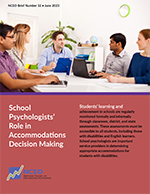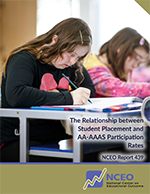In addition to the parent resources highlighted in this newsletter, NCEO recently published several other new products.
School Psychologists’ Role in Accommodations Decision Making (NCEO Brief #32)
Students’ learning and achievement in schools are regularly monitored formally and informally through classroom, district, and state assessments. School psychologists have a specialized understanding of data-based decision making, consultation, provision of academic assessment and intervention services, and the special education eligibility process. The accommodations decision-making process is one area where school psychologists can provide valuable knowledge and expertise to support students with disabilities in instruction and assessment. This Brief explains a five-part framework for educators and other specialists who serve students, including school psychologists, to use in the selection, administration, and evaluation of accommodations for the instruction and assessment of all students, including students with disabilities and English learners.
The Relationship between Student Placement and AA-AAAS Participation Rates (NCEO Report #439)
This report presents the findings of a study that looked at the relationship between states’ percentage of students participating in the alternate assessment aligned with alternate academic achievement standards (AA-AAAS) and the percentage of students in more restrictive learning environments. The 2015 reauthorization of the Elementary and Secondary Education Act (ESEA), known as the Every Student Succeeds Act (ESSA), placed a 1% cap for states on student participation in the AA-AAAS. This meant that states, districts, and individualized education program (IEP) teams need to carefully consider which students should be included in these assessments. Data used in this analysis were for 2018-19. This study found that states with higher percentages of students in more restrictive environments tended to have higher percentages of students participating in the AA-AAAS for both mathematics and reading.
2021-22 Participation Guidelines and Definitions for Alternate Assessments Based on Alternate Academic Achievement Standards (NCEO Report #440)
This report provides an update to previous analyses of the guidelines, definitions, and criteria states have developed for making decisions about alternate assessments based on alternate academic achievement standards (AA-AAAS) participation. This report provides an analysis of the 2021-22 policies of the 50 states and the District of Columbia. We analyzed criteria that should be used and factors that should not be used to determine participation, the state definitions of “most significant cognitive disabilities,” the information provided to parents about the AA-AAAS, mentions of English learners in materials related to the AA-AAAS, exemption and non-exemption materials regarding participation, and the content areas for which participation decisions are made.



